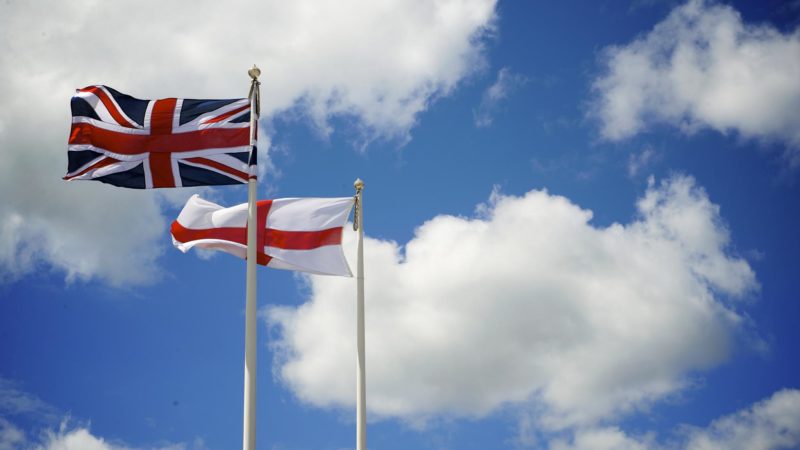
George Orwell’s infamous declaration that “England is perhaps the only great country whose intellectuals are ashamed of their own nationality” comes into its own every St George’s Day. With the major Brexit tribes now engaging in full blown culture war, this assessment has never been so relevant.
On one side, we have Nigel Farage’s new (hard) Brexit Party ramping up the rhetoric against an ‘unpatriotic’ liberal elite. On the other, we have a group of mostly university-educated second referendum campaigners appalled by an apparent rise in right-wing nationalism. What the latter camp have never understood is just how much their politics has allowed space for the former.
Brexit was, and is, a largely English phenomenon. It was England-outside-the-cities that delivered the Leave vote by a huge margin of 11%. Those who saw themselves as more English than British were more likely to vote Leave, while those more British than English tended to back Remain. Working-class voters backed Leave despite every arm of the establishment working against them.
But these trends did not suddenly appear overnight. And if it was all about austerity, England would have voted for Ed Miliband in 2015, bacon sandwich fail or not. English discontent goes far deeper. First, a shocking absence of an industrial strategy for England’s towns during an era of deindustrialisation and high-speed globalisation has left these bereft of identity and good work. Consecutive governments of different stripes are to blame.
Then there is what MPs such as David Drew call ‘the English question’; why is it that Scotland and Wales have been given permission to govern their own affairs, but all the English are offered is piecemeal devolution? In his recent book, Anthony Barnett explains the connection between this lack of empowerment and certain English towns that were more likely to vote Leave than their Scottish equivalents despite similarities in wealth.
The most staggering failure of liberal politicians has been the inability to ‘nation-build’. England currently has little sense of shared citizenship or purpose. The identity politics of the left has been the complete antithesis of building a progressive nation, cutting up society into smaller and smaller groups, each with their own agenda and each trying to silence one another from commenting on their affairs. Diversity can be a real strength within a nation, but only if we focus as much on the common bonds shared by groups and individuals. The alliances that are built between friends of different faiths, races and sexualities are not built on differences but on what is shared – humour, sport, music, politics, place, family life.
Labour should take note. It is all well and good saying Labour should be “for the many, not the few”, but who are ‘the many’ and what do they share in common? We know who ‘the few’ are – the super wealthy. What values and priorities connect the rest of us? As former cabinet minister John Denham has written:
“If none of us felt a shared identity with each other, and we all held just our own stories and individual identities, our country would feel very different. The willingness to pay tax, to support the shared institutions like the NHS or the armed forces, or to support those in hard times, depends on a collective sense of ourselves as more than individuals who happen to share the same space. The value of building a national identity goes well beyond notions of patriotism. It goes to heart of creating a society that can sustain progressive social change.”
Our party got this right in the late 1990s with ‘Cool Britannia’, before the rise in identity politics, the failure to shape globalisation and the financial crash that splintered society. Now it is specifically England that is most in need of shared identity and purpose to unite its diverse population.
Holding proper St George’s Day celebrations could would be a start. Under the next Labour government, April 23rd will be a national holiday. The English Labour Network has produced a pamphlet showing how we can use St George’s Day to celebrate an inclusive, modern England. Labour members are taking this seriously and at a recent event in Stroud they came up with a number of ideas for how we could mark our national day.
Yet our party still too often fails to speak to England. Labour’s campaign for the local elections next month is set against the backdrop of “Rebuilding Britain” – even though all contested seats (bar by-elections) are in England. We must not forget that four out of five people in England feel proud to be English. 80% of England’s population are certainly not ‘far right’ – they simply feel pride or shame depending on how their country behaves. St George’s Day is their day too.
While 49% of English residents think England was better in the past (while only 17% think England’s best years lie ahead), the opportunity is there for Labour politicians to offer an exciting vision for England’s future that connects with English hopes and aspirations. Failing to do so will only push more and more people towards the simplistic and dangerous messages of Nigel Farage.




More from LabourList
Nudification apps facilitate digital sexual assault – and they should be banned
Diane Abbott suspended from Labour after defending racism comments
Labour campaign groups join forces to call for reinstatement of MPs